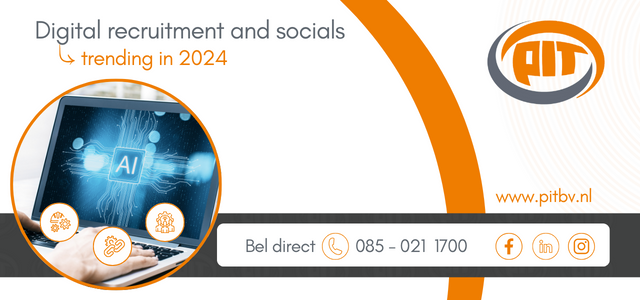
apr 9, 2024 | Algemeen
In the contemporary recruitment landscape, digital developments are causing a significant shift in the way businesses seek and hire employees. Traditional recruitment agencies are finding themselves at the crossroads as digital platforms, artificial intelligence, and machine learning are challenging established practices. The growing panic among recruitment agencies is palpable as they scramble to stay relevant in a rapidly transforming environment.
The Rising Panic Among Recruitment Agencies Due to Digital Advancements
The ascendancy of digital platforms in recruitment has caused a seismic shift in the sector. LinkedIn, Indeed, Glassdoor, and other job boards have not only democratized access to job opportunities but have also provided a plethora of data to employers about potential candidates. This has resulted in a significant reduction in the need for traditional recruitment agencies. Moreover, platforms like Upwork and Fiverr have made it easier to hire freelancers for specific tasks, further diminishing the role of recruitment agencies. The panic among these agencies is evident as they struggle to justify their services and fees in this new landscape.
The advancement of artificial intelligence and machine learning has compounded the challenges faced by traditional recruitment agencies. AI-powered recruitment tools like chatbots, resume screeners and interview scheduling tools have automated many of the tasks traditionally performed by recruitment agencies. These tools not only offer efficiency and cost savings but also reduce human bias, making the recruitment process more equitable. As a result, there is a growing sense of panic among recruitment agencies as they grapple with the reality of being replaced by machines.
Understanding the Impact of Digital Developments on Traditional Recruitment Practices
The impact of digital advancements on traditional recruitment practices is profound. The use of applicant tracking systems and predictive analytics in recruitment has streamlined the process, making it quicker, more efficient and ultimately more effective. It has become easier to track the performance of candidates throughout the hiring process, which allows businesses to make better hiring decisions.
The digital revolution has also led to the emergence of new recruitment models. For instance, the gig economy has gained momentum partly due to digital recruitment platforms that connect businesses with independent contractors and freelancers. This shift has disrupted the traditional full-time employment model, with more people opting for flexible work arrangements. Consequently, recruitment agencies that primarily focus on placing full-time employees are feeling the heat.
The digital developments in the recruitment sector are a double-edged sword. On one hand, they offer numerous advantages such as increased efficiency, reduced costs, and more equitable hiring practices. On the other hand, they pose significant challenges to traditional recruitment agencies. As these agencies grapple with the rapidly changing landscape, it is imperative for them to adapt and evolve. Embracing digital transformation and finding ways to add value in the new recruitment ecosystem may be their best bet to survive and even thrive in the era of digital recruitment.

apr 9, 2024 | Algemeen
As we stand on the cusp of 2024, the world of recruitment is rapidly evolving. The technological advances of recent years, coupled with the work-from-home trend triggered by the global pandemic, have drastically reshaped hiring strategies. With organizations of all sizes embracing digital platforms to attract, engage, and hire top talent, online recruitment is quickly becoming the new normal. This article explores the emerging trends and strategies for online recruitment in 2024 and how businesses can leverage digital platforms for effective talent acquisition.
Online Recruitment in 2024: Emerging Trends and Strategies
Online recruitment, or e-recruitment, is no longer a novelty but a strategic necessity. The increasing adoption of advanced technologies such as Artificial Intelligence (AI), Machine Learning (ML), and predictive analytics have significantly improved the efficiency, speed, and accuracy of the recruitment process. For instance, AI-powered chatbots and virtual assistants are now commonly used for initial candidate screening and interview scheduling, while ML and predictive analytics help recruiters identify patterns and make data-driven decisions.
The second trend is the growing importance of a strong employer brand and a positive candidate experience. In 2024, job seekers are more informed and demanding than ever. They expect seamless, personalized experiences throughout the recruitment process. This means businesses need to invest in developing a compelling employer brand and optimizing their online application process. Social media and content marketing are key tools for promoting your employer brand and engaging potential candidates.
Harnessing the Power of Digital Platforms for Talent Acquisition in 2024
In 2024, effective talent acquisition is not just about posting job ads online. It requires a comprehensive digital strategy that leverages the full potential of various digital platforms. Recruitment Advertising Platforms (RAPs) are growing in popularity. These platforms offer advanced targeting capabilities, allowing businesses to reach specific job seekers based on their skills, experience, location, and more. Utilizing RAPs can significantly improve the quality of your candidate pool and reduce time-to-hire.
Furthermore, social media is proving to be a potent tool for talent acquisition. LinkedIn, Facebook, and Twitter are well-known for job postings and recruitment, but employers are now also turning to less conventional platforms such as Instagram and TikTok to reach younger, tech-savvy talent. Employee advocacy programs, where employees share job openings and positive company experiences on their personal social media, are also effective in attracting high-quality candidates.
In 2024, online recruitment is not just about innovating but also about adapting to change. As digital technologies continue to evolve, so will recruitment strategies and practices. Embracing new trends and harnessing the power of digital platforms will be key to attracting and hiring top talent. To stay competitive in the talent market, businesses need to stay abreast of these developments and be ready to innovate their recruitment strategies continually. The future of recruiting is digital, dynamic, and driven by data.

apr 9, 2024 | Algemeen
In a world that’s increasingly digital and interconnected, the concept of employer branding has evolved significantly. It’s no longer just about the logo and the tagline; instead, it’s about the entire experience a company offers to its employees. In 2024, employer branding has become more critical than ever, with companies needing to showcase their unique workplace cultures, values, and advantages to attract and retain top talent.
Understanding Employer Branding in the 2024 Workplace
Employer branding in 2024 is essentially how a company markets itself to potential and existing employees. It’s about the perception of a company as a great place to work and is driven by the company’s mission, values, culture, and people. It’s a holistic concept that covers everything from the company’s reputation and image to its work environment, policies, and benefits. In today’s highly competitive job market, employer branding is a key differentiator that can help companies attract, engage, and retain top talent.
The rise of social media and digital platforms has fundamentally changed employer branding in 2024. Prospective employees now have access to a plethora of information about companies, including reviews and ratings from current and former employees, behind-the-scenes looks at the company culture, and insights into the company’s policies and work environment. This increased transparency means that companies can’t just talk the talk; they have to walk the walk. Any discrepancy between a company’s external image and the actual employee experience can lead to a damaging reputation and a loss of trust.
The Paramount Importance of Employer Branding in 2024
In 2024, employer branding is more important than ever. With the job market becoming more competitive and the workforce becoming more diverse, companies need a strong and authentic employer brand to differentiate themselves and attract top talent. According to LinkedIn, 75% of job seekers consider a company’s employer brand before applying for a job. A strong employer brand can also reduce the cost per hire by up to 50% and decrease the turnover rate by 28%.
Employer branding is also crucial for employee engagement and retention. A company with a strong employer brand is more likely to have engaged employees who are committed to the company’s success. Furthermore, a strong employer brand can help companies attract and retain diverse talent. In 2024, diversity and inclusion are not just buzzwords; they’re business imperatives. A company that showcases its commitment to diversity and inclusion through its employer brand is more likely to attract a diverse pool of candidates, which can lead to better business outcomes.
In conclusion, as we navigate through 2024, employer branding will remain a critical element for businesses looking to attract, engage, and retain top talent. With the continued rise of social media and digital platforms, companies need to be authentic and transparent in their employer branding efforts. By focusing on their unique values, culture, and benefits, companies can differentiate themselves in a competitive job market and build a strong employer brand that resonates with both potential and existing employees. Strong employer branding is not just about attracting top talent; it’s about creating an environment where employees want to stay and grow.

apr 9, 2024 | Algemeen
In the contemporary digital age, traditional methods of recruitment have seen a seismic shift. The advent and growth of social media platforms offer a viable and effective medium to attract, engage, and recruit potential candidates. The seamless amalgamation of recruitment and social media – often termed as Social Recruiting – is becoming a preferred strategy for many organizations. This article explores the nuances of digital recruitment using social media and provides strategies to capitalize on these platforms for effective hiring.
Harnessing Social Media for Digital Recruitment: An Insight
Social media platforms, with their extensive reach and vast user base, serve as a fertile ground for sourcing potential candidates. According to a study by Jobvite, 92% of recruiters use social media in their hiring process. LinkedIn, the professional networking site, is at the forefront of this digital recruitment revolution. It enables recruiters to post job vacancies, search for potential candidates, and even check references. However, the scope of social media in recruitment is not limited to LinkedIn alone. Platforms like Facebook and Twitter also serve as active recruitment hubs, allowing recruiters to post job ads, engage with candidates, and build employer branding.
The ubiquitous nature of social media platforms allows recruiters to tap into a diverse talent pool. It provides an opportunity to engage with passive candidates – those who might not be actively looking for a job but could be open to new opportunities. Moreover, social media also facilitates employer branding, a critical aspect of attracting top talent. By showcasing the organizational culture, values, and employee experiences, businesses can create a compelling image that draws potential candidates. This two-pronged approach of sourcing candidates and enhancing employer branding makes social media a powerful recruitment tool.
Strategies for Effective Digital Recruitment via Social Media Platforms
To maximize the benefits of social media recruitment, organizations need to adopt specific strategies. Firstly, it’s important to choose the right platform. While LinkedIn is an obvious choice for professional networking, Facebook’s job feature and Twitter’s hashtags can also yield significant results. Different platforms cater to different demographics, and understanding this can help recruiters target their efforts effectively.
Secondly, businesses need to create engaging content. Job postings should be more than just a list of requirements and responsibilities. Inclusion of videos, employee testimonials, and insights into the working environment can make the job advertisement more appealing. Additionally, being responsive on social media platforms is crucial. Prompt responses to queries and comments can enhance engagement and create a positive image of the organization. Finally, organizations can utilize social media analytics to understand what’s working and what’s not. These insights can aid in refining the recruitment strategies for better results.
In conclusion, social media platforms have emerged as an effective medium for digital recruitment. They offer a unique blend of reach, engagement, and employer branding, making them indispensable in the modern recruitment landscape. However, to fully harness their potential, organizations need to implement thoughtful strategies tailored to each platform. As the digital landscape continues to evolve, social media recruitment is likely to grow in prominence, shaping the future of hiring practices.

apr 9, 2024 | Algemeen
In a world that thrives on innovation, continuous growth, and transformation, it’s vital to refresh, rejuvenate, and revamp to meet the ever-evolving demands and expectations of the market. PIT BV, a name synonymous with groundbreaking innovations and exceptional services, has taken a colossal stride in this direction by unveiling its fresh logo and branding. It’s a bold move that marks a new era of expansion, growth, and possibilities.
Unleashing a New Era: PIT BV Boldly Unveils Fresh Logo and Branding!
In the spirit of continuous progress and transformation, PIT BV has unveiled its fresh logo and branding, radiating a bold and vibrant energy that perfectly aligns with the company’s vision and mission. The new logo is the perfect amalgamation of simplicity and modernity, reflecting PIT BV’s commitment to delivering unparalleled innovation and service. The minimalistic design, combined with striking colours, not only enhances the visual appeal but also conveys the company’s steadfast commitment to excellence, quality, and reliability.
But, it’s not just about revamping the aesthetics. The new branding is an emblem of PIT BV’s growth, maturity, and its readiness to embrace future challenges with more vigour and determination. The new look does more than just signal the company’s evolution; it is a testament to the brand’s commitment to adapt, reinvent, and stay ahead in the ever-competitive market. The new branding is a pledge to its customers – a promise of maintaining unparalleled quality, commitment, and steadfast dedication to innovation.
Step Into The Future With PIT BV’s Revamped, User-Friendly Website!
Along with the new logo and branding, PIT BV has also launched its revamped website, designed to provide a seamless, user-friendly experience to its clients and partners. The new website is a vibrant digital landscape that reflects the company’s innovative spirit and commitment to providing excellent services. The modern design, coupled with easy navigation and a plethora of information, makes it a pleasure to explore.
The revamped website showcases PIT BV’s wide range of products and services more effectively, allowing customers easy access to all the information they need. The website also features a responsive design, ensuring optimal viewing and interaction experience—easy reading and navigation with a minimum of resizing, panning, and scrolling—across a wide range of devices. This is a step towards a future where PIT BV’s digital presence is as impactful and effective as its real-world operations.
In this era of endless innovation and ceaseless evolution, staying stagnant is not an option. With its fresh logo, new branding, and a revamped website, PIT BV is not just embracing change; it is actively driving it. The new look and feel of PIT BV, both offline and online, is a bold statement – a reaffirmation of its commitment to growth, innovation, and excellent service delivery. As we step into this new era with PIT BV, we look forward to a future that promises endless possibilities, remarkable innovations, and a world-class customer experience.





